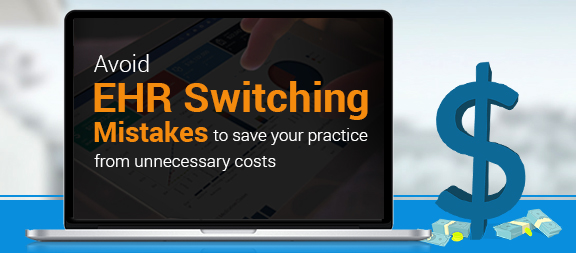If you’re considering taking advantage of the Medicare and Medicaid Incentive Programs by switching to a more efficient EMR system, a word of caution: even though the new implementation will no doubt benefit your practice by enabling you to effectively manage the needs of your patients, the initial transition phase may be fraught with challenges (read: headaches).
To help you and your staff cope with these possible challenges, here are some common mistakes to avoid like the flu.
Not ensuring your staff is comfortable
If your staff isn’t happy, your business will suffer, which is why it’s really important to make sure they are comfortable with the new workflow, interface, and technical aspects of your recently installed system. If you expect everything in your office to be up and running immediately, chances are that your staff’s morale will dip, productivity will suffer and your revenue will take a hit.
Before going live, make it a point to clear away any unnecessary administrative tasks so that your scheduling, coding and billing staff have the time to familiarize themselves with the new system. Also, if at all possible, try and set aside some extra funds in your EHR Replacement budget to help you cover any costs that result from the adjustment period.
Not being in charge
One of the biggest and costliest EHR mistakes a physician can make, is to not step up and take a leadership role during the transition process. Your practice’s livelihood depends on the success of the new implementation. That success depends on whether you’ve delegated leadership to someone else, or if you’ve been instrumental in the implementation yourself, by helping staff understand how and why the new system will significantly improve the quality, safety and the patient experience.
You obviously want the implementation to happen as quickly as possible, so you’ll be tempted to hand off the decision-making to a trusted staff member. But keep in mind, this staff member won’t understand your goals or have the same view of your practice as you do. Even with the new EHR system in place, they may carry on with business as usual instead of focusing on the new benefits the system offers. Set your practice’s strategy, share your goals and priorities, and communicate clearly, so your staff embraces change and follows your lead.
Not working with your current and future EHR vendor jointly
When converting to a new EHR system, you may find that your new vendor uses solutions that are different from the ones you are currently using. Because of these technology variables, it’s really important you collaborate with your current vendor to help facilitate as smooth a transition as possible. Once the new system is in place, you can be sure that you and your staff will have plenty of questions, so make your new EHR vendor a part of your team and take full advantage of their knowledge and online resources.
Having unrealistic expectations
Granted, new certification criteria dictate that EHR software packages be more advanced than they were only a few years ago, but it’s still vitally important that you make the switch with realistic expectations of what your system can and can’t do for your practice. Help your staff understand what tasks they may or may not be able to perform and how their workflow will change in order to make the most out of the new software.
Ignoring problems
Any process change is bound to bring with it a whole host of problems. Once your system goes live you may very well find functions you don’t understand, and configurations that need to be redesigned. This is to be expected.
The best way to get these issues sorted out, and to quickly get the system up and running properly, is to ask for feedback from your staff after implementation. And, when issues arise, prioritize them so you can get the most important ones resolved first. For instance, helping the nurses enter pathology results accurately is much more important than redesigning the workflow.
Switching over to a new EHR system is no walk in the park. But if you can avoid these common implementation mistakes, your practice has a much better chance of achieving long-term success.
